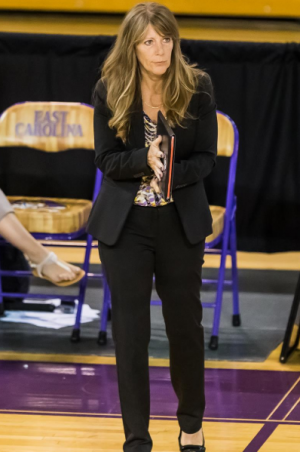While sampling dishes at the Greenville Fire-Rescue Chili Cookoff on Wednesday, East Carolina head volleyball coach Julie Torbett encountered the same question several times: “Aren’t you getting ready for your conference tournament?”
Torbett understands why even knowledgeable fans assumed the Pirates were heading to Orlando to compete against other American Athletic Conference teams. Only six teams make the tournament field, but ECU finished third in the East Division, so if the top three teams from each division qualified it would follow that they made the cut.
Unfortunately, what appears to be a simple equation is anything but, and despite an overall record of 19-11 the Pirates’ season is over, their hope of postseason glory curtailed.

“Everyone just assumes we’re still playing because we had such a great season,” Torbett said.
When the AAC volleyball coaches met late last year to establish the criteria for their sport’s first conference tournament, they decided that the top two teams in each division’s standings, along with the two teams with the best overall record, would compete in the event. That means that Southern Methodist (11-5) and Houston (10-6) from the West and Cincinnati (15-1) and Central Florida (14-2) from the East were automatic qualifiers, but the fifth and sixth best records both belonged to teams in the West—Tulane (10-6) and Tulsa (8-8).
The strength of the top Eastern teams hurt the Pirates, because the parity in the West gave teams on that side the opportunity to amass wins and improve their shot at the postseason. Between the dominance of Cincinnati and UCF and a September loss to Tulsa, the math was all but decided more than three weeks ago, which dampened the late-season motivation of the Pirates in a home stretch that, with a different postseason formula, could have carried significant consequences.
The Pirates lost three of their final four matches, but victories wouldn’t have altered their fate.
“The way we set it up as coaches, we didn’t do us any favors in the East Division,” Torbett said. “We complicated it. I wasn’t thinking about it in a way that we would be potentially left out, and nobody thought Houston would do what they did.”
If you see the world through a college basketball lens, you assume that every team gets a chance to play in the conference tournament, but many non-revenue sports are forced to limit their field for financial reasons. Some of the conference’s volleyball coaches were opposed to a tournament at all, Torbett said, but other than a ripple with the departure of Connecticut, the eligibility standards are not expected to change going into next season.
The American’s procedure is to allow each sport’s coaches to vote on whether a postseason tournament will be held and how teams will qualify. They consider what other conferences do, but ultimately the format is left up to the coaches in purely team sports. Sports with an individual component, like track and swimming, host all-comers conference meets, but usually the conference meet is the only time those athletes face their American opponents, and their regular-season travel is more regional and less expensive.
Looking ahead to 2020, Torbett believes ECU can become a consistent force in the conference, the kind of team that becomes an automatic lock for both the AAC and the NCAA tournaments. The Pirates lost to Memphis and Houston in five sets, and in the Houston defeat, on October 18 on the road, ECU squandered three match points. If those two contests had gone the other way, the pendulum could have swung to allow the Pirates to still be playing today.
“We didn’t do what we needed to do,” she said. “But it was certainly a season that we can really draw on to bring in good recruits.”
For now, Torbett will regroup, focus on helping a few of her starters achieve complete recovery from some nagging injuries, and watch as ECU’s conference opponents compete for a spot in volleyball’s big dance in December. Cincinnati and UCF are virtually assured of a bid regardless of what happens in Orlando, so an upset win in the tournament would allow three teams to make it — an outcome that ultimately boosts the conference and all of its members.
How can anyone with a .375 (6-10) conference record complain about not being in the tournament?